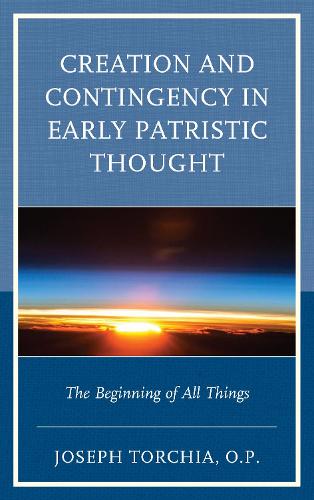
Creation and Contingency in Early Patristic Thought: The Beginning of All Things
(Hardback)
Available Formats
Publishing Details
Creation and Contingency in Early Patristic Thought: The Beginning of All Things
By (Author) Joseph Torchia
Bloomsbury Publishing PLC
Lexington Books
10th April 2019
United States
Classifications
Professional and Scholarly
Non Fiction
Christianity
Religion and beliefs
Theology
Philosophy
231.765
Physical Properties
Hardback
264
Width 161mm, Height 229mm, Spine 26mm
585g
Description
Creation and Contingency in Early Patristic Thought: The Beginning of All Things explores the interface between philosophy and theology in the development of the seminal Christian doctrine of creation ex nihilo. While its main focus lies in an analysis of first to third century patristic accounts of creation, it is likewise attuned to their parallelism with Middle Platonic commentaries on Platos theory of cosmological origins in the Timaeus. Just as Christian thinkers sounded out the theological implications of Gn 1:1-2, the successors to Platos Academy debated the significance of his teaching (Tim. 28b) that the world came to be. The fact that both Genesis and the Timaeus address the beginning of all things served as a means of bridging the conceptual gap between the Greek philosophical tradition and a Christian perspective rooted in scriptural teaching. Platos Timaeus and the doxographies it inspired thus provided early Fathers of the Church with the dialectical resources for explicating their distinctive understanding of creation as a bringing into being from nothing.
Reviews
This superbly-written workfills a void when examining the cosmogonies of the 2nd and 3rd centuries. Instead of tracing the rarely-used expression 'ex nihilo,' Torchia's focusing in on the metaphysical concept of 'contingency' is brilliant, showing how Athens and Jerusalem stressed the unquestioned omnipotence of the divine and the obvious mutability of matter in different ways. -- David Meconi, SJ Director, The Catholic Studies Centre, Saint Louis University
What do the earliest Greek patristic readings of the opening verses of Genesis have to do with Plato'sTimaeus For the answer, I highly recommend Torchia's excellent account. -- Andrew Hofer, O.P., Dominican House of Studies
Joseph Torchia has given us a careful and thought-provoking study of the development of the Christian doctrine of creation ex nihilo. Beginning with an examination of the doctrine of creation in Scripture, where a metaphysical dimension of creation from non-being is discernable only inchoately, Torchia traces the emergence of an explicitly metaphysical doctrine within the early Church. Through dialogue with and assimilation of the Greek philosophical traditions (viz. Plato and the Middle Platonists) patristic thinkers ultimately articulated the idea that Gods role as Creator involves fundamentally an existential creation from non-being. Such a development paved the way for new and more sophisticated theological and metaphysical questions to be asked within the Christian Tradition. Fr. Torchias study will be helpful and particularly illuminating for graduate students and anyone who is interested in questions regarding the development of doctrine, the relationship between Hellenistic philosophy and Christian thought, faith and reason in the Christian Tradition, and patristic metaphysics of creation (protology). -- Ron Rombs, University of Dallas
Author Bio
Joseph Torchia, O.P. is professor of philosophy at Providence College.
